Professor Green introduces Kate to his Nanny Pat at kinship carer …
Rapper Professor Green introduced the Princess of Wales to his Nanny Pat – and she had even bought a new blouse for the occasion.
The songwriter’s grandmother got up extra early to have her hair done on Thursday before being introduced to Kate at a support group session for kinship carers in London.
The princess also played with children on the floor as she met a group of carers at Saint Pancras Community Association in Camden who have been supported by charity Kinship.
Kinship care is when a child is looked after by their extended family or close friends if they cannot remain with their birth parents.
Professor Green, born Stephen Manderson, was raised by his grandmother after his mother gave birth to him at the age of 16.
He said his Nanny Pat was “very nervous” to be meeting the princess and had got her hair done beforehand and bought a new blouse.
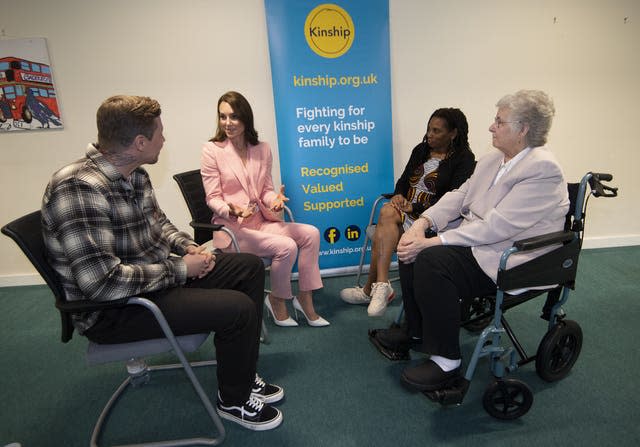
The Princess of Wales with Professor Green and his Nanny Pat (far right) during a visit to the Saint Pancras Community Association in Camden (Eddie Mulholland/Daily Telegraph/PA)
The rapper added: “It’s the first time Nanny Pat met Kate, she was very nervous.
“My aunty had her up early to do her hair and bought a new blouse. She was very excited.”
The singer said his “kinship experience” began when a nurse handed him to his grandmother as a baby in hospital instead of his mother.
He added: “The nurse handed the baby to my nan as she looked more the age.”
Speaking about being brought up by his grandmother, Manderson said: “It was just the done thing. Family doesn’t necessarily mean two parents with 2.4 children. My home wasn’t broken.
“The amazing thing about charities like this is it’s focusing on early intervention, there’s things as a child I would’ve better coped with.”
Kate sat on a playmat and passed toys to children as she discussed the important role kinship carers play in a child’s development, the challenges they face and the support available to them provided by charities such as Kinship.
Carer Naomi chatted to the princess while two-year-old Tia played with toys in front of them.
Naomi, from east London, whose last name was not given for security reasons, told the PA news agency she was doing Tia’s hair on Wednesday night telling her she would be meeting a princess and the youngster replied “but I am a princess”.
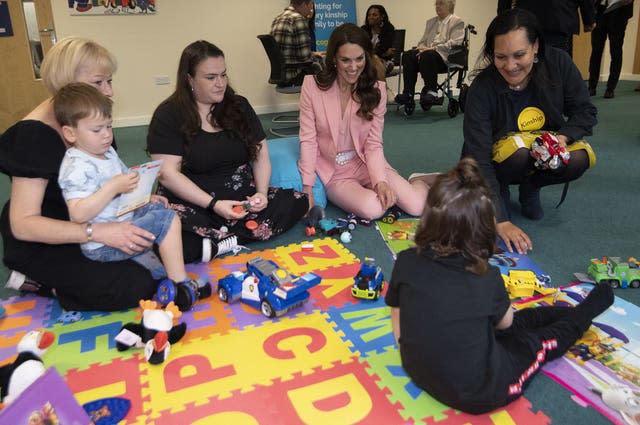
Kate played with some of the children in kinship care (Eddie Mulholland/Daily Telegraph/PA)
Naomi said looking after Tia was the first time she became a mother – at the age of 67.
She added of their kinship: “People told me ‘you’re too old’ and ‘you’re not going to be able to sleep’; now that I’ve got her I couldn’t imagine not having her in my life.”
Kirsty, from south-east London, was at the group session with her nephew Blue, aged three, who she has looked after since he was five months old.
She said after meeting Kate: “It was just so lovely. It means a lot, it really does.
“She was asking what it’s been like for us and what support we get and talking about childhood development.
“She seemed to really care about it, it really was lovely.”
There are more than 162,000 children being raised in kinship care in England and Wales, many who have experienced trauma in their earliest years, and who benefit from family members or friends being able to step up and care for them.
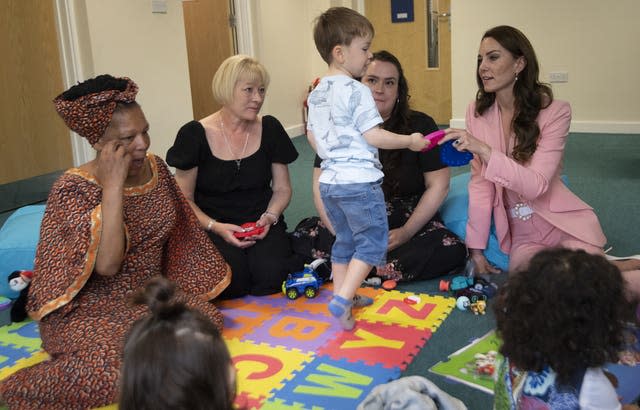
The Princess of Wales with kinship carers and children in Camden (Eddie Mulholland/Daily Telegraph/PA)
Kinship supports more than 10,000 kinship carers in England and Wales each year through free training sessions, peer support groups, one-to-one support, an expert advice line and an online information and support hub.
Earlier Kate praised young people who shared their experiences of the care system, describing their efforts as “amazing” and telling them she was “honoured” to meet the group.
Her comments came when she toured central London’s Foundling Museum, which chronicles the Foundling Hospital established in the 18th century to care for abandoned children, to hear the care leavers’ stories and meet adoptive and foster parents.
The day of visits was aimed at highlighting the importance of nurturing children’s relationships in early childhood and beyond, including those outside traditional parent and child settings.
Kate was joined by Professor Green, a supporter of the princess’s early years Shaping Us Campaign, when she sat down with a group of young people who have been through the care system.
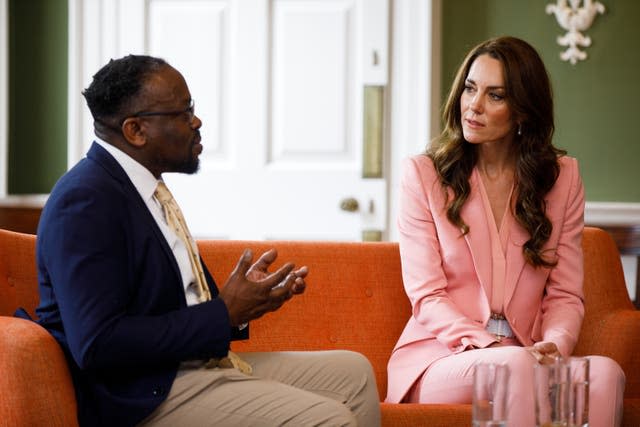
The Princess of Wales during a visit to the Foundling Museum (Tristan Fewings/PA)
One 18-year-old woman, who had been in care for 10 years, told Kate: “I didn’t know how to be loved because of my experiences” but went on to describe how previous foster parents, both male, helped her to break down the emotional barriers.
Later the princess paid tribute to the young people, saying: “It’s extraordinary the journey, all of the experiences that you’ve gone through that’s why you’re here.
“Being able to communicate and express how you feel – it’s amazing to be able to do this, you shouldn’t take it for granted – it’s fantastic.
“And I feel so honoured to meet all of you, to hear your journeys and also your passions and aspirations.”
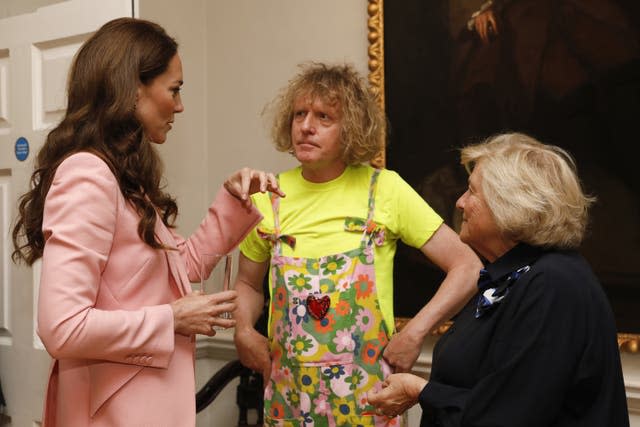
The Princess of Wales speaks to Sir Grayson Perry (centre) during a visit to the Foundling Museum (Tristan Fewings/PA)
During a reception for museum supporters Kate met artist Sir Grayson Perry, a trustee of the museum Kate represents as patron, who was dressed in a trademark colourful dungaree, which he jokingly referred to as his “smart casual look”.
Sir Grayson praised the philanthropic foresight of leading creatives from the 18th century – painter William Hogarth, a governor of the Foundling Hospital founded by his friend Thomas Coram, and composer Handel who fundraised for the institution, now a charity supporting children, with a number of benefit concerts.
After chatting to Kate, Sir Grayson said: “That’s quite a unique thing you know, that Handel and Coram and Hogarth got together to set up this place – the Foundling hospital.
“Nowadays with telethons on the telly we take it for the granted that culture is going to help. These were the guys that almost started the idea of Live Aid – they did Live Aid in the 18th century.”